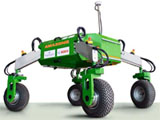Agricultural and Biological Systems Engineering, Department of

Department of Agricultural and Biological Systems Engineering: Faculty Publications
Document Type
Article
Date of this Version
2017
Citation
Koudahe, K., Djaman, K., Bodian, A., Irmak, S., Sall, M., Diop, L., Balde, A.B. and Rudnick, D.R. (2017) Trend Analysis in Rainfall, Reference Evapotranspiration and Aridity Index in Southern Senegal: Adaptation to the Vulnerability of Rainfed Rice Cultivation to Climate Change. Atmospheric and Climate Sciences , 7, 476-495. https://doi.org/10.4236/acs.2017.74035
Abstract
Rainfall and evapotranspiration are two vital elements for food production under rainfed agriculture. This study aims at investigating the combined changes in these variables in the form of aridly index in the southern Senegal. The temporal trends in annual and monthly (from May to October) aridity index, rainfall and evapotranspiration are examined and adaptation strategies to the vulnerability of rainfed rice cultivation to the changes are developed. The results show a significant decreasing trend in annual rainfall at all study locations for the period 1922-2015. When analyzing the trends in sub-periods, there are two clear patterns in the annual rainfall series: a decreasing trend for the period 1922-1979 and a reversal increasing trend for the period 1980-2015. An increasing trend is also observed in annual reference evapotranspiration. The results reveal that the region will be drier with a significant increase in aridity at the annual and most monthly series. Appropriate adaptation strategies should be implemented to diminish the adverse influence of the increasing aridity on rice productivity for a sustainable agriculture.
Included in
Bioresource and Agricultural Engineering Commons, Environmental Engineering Commons, Other Civil and Environmental Engineering Commons


Comments
Copyright © 2017 by authors and Scientific Research Publishing Inc. This work is licensed under the Creative Commons Attribution International License (CC BY 4.0).